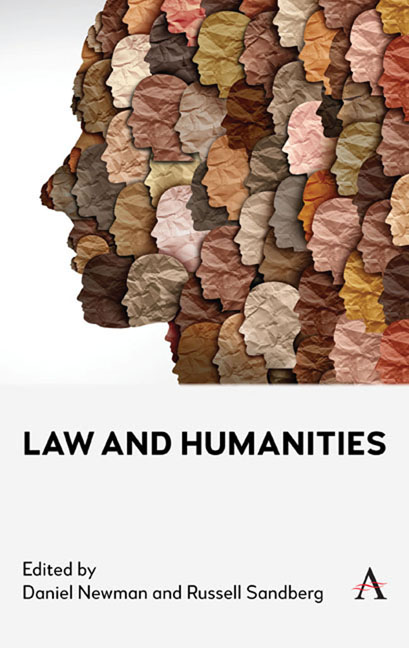Book contents
- Frontmatter
- Contents
- Preface
- List of Contributors
- Chapter One Introducing Law and Humanities
- Chapter Two Law and Archaeology
- Chapter Three Law and Comics/Graphic Justice
- Chapter Four Law and Film
- Chapter Five Law and Geography
- Chapter Six Law and History
- Chapter Seven Law and Literature
- Chapter Eight Law and Philosophy
- Chapter Nine Law and Popular Music
- Chapter Ten Law and Religion
- Chapter Eleven Law and Television
- Chapter Twelve Law and Theatre
- Chapter Thirteen Law and Theology
- Chapter Fourteen Law and Video Games
- Chapter Fifteen Conclusion: Subverting the Law and Humanities Canon
- Index
Chapter Five - Law and Geography
Published online by Cambridge University Press: 27 March 2024
- Frontmatter
- Contents
- Preface
- List of Contributors
- Chapter One Introducing Law and Humanities
- Chapter Two Law and Archaeology
- Chapter Three Law and Comics/Graphic Justice
- Chapter Four Law and Film
- Chapter Five Law and Geography
- Chapter Six Law and History
- Chapter Seven Law and Literature
- Chapter Eight Law and Philosophy
- Chapter Nine Law and Popular Music
- Chapter Ten Law and Religion
- Chapter Eleven Law and Television
- Chapter Twelve Law and Theatre
- Chapter Thirteen Law and Theology
- Chapter Fourteen Law and Video Games
- Chapter Fifteen Conclusion: Subverting the Law and Humanities Canon
- Index
Summary
Introduction: Studying the Legal in Legal Geography
Legal geography explores the interconnections between law and space, a field of study that relates law to context, while simultaneously revealing geography’s legal footprints. The rich interconnections between law and space, and the diverse ways that each co-inform and co-constitute the other are legal geography’s ‘core objects of inquiry’. In this chapter, we observe how this area of scholarship has evolved over nearly three decades, beginning in the mid-1990s, a generational confluence of law and geography that is neither a ‘sub-discipline of human geography nor […] an area of specialized legal scholarship’ but rather (or, at least) ‘a truly interdisciplinary intellectual project’.
As a discrete ‘intellectual project’, legal geography features several defining characteristics. Core to its mission is to emplace law and to bring law to landscape. Legal geography likewise takes a broad sweep of form: from grand theory to the ‘small’; from global observations of space, time and law to (sometimes very local) place-based case studies; and from explicit disciplinary articulation to an implied nuanced analysis. In the latter case, legal geography can play a significant, albeit often unacknowledged role in informing the scholarship.
Writing in 1994, the foundational legal geographer Nicholas Blomley quoted Lawrence Friedman and David Harvey, who each in turn (yet separately) recognised the limitations of their own disciplines. Friedman argued ‘law […] is too important to be left to lawyers’, while Harvey mirrored this sentiment word for word, noting that ‘geography is too important to be left to geographers’. Each gave voice to a gap that these two complementary disciplines had left lying on the field, a ‘hidden to plain sight’ lacuna of spatial relations where law fails to acknowledge the world it inhabits, and geographers ignore or undervalue how ‘social spaces, lived places, and landscapes are inscribed with legal significance’.
In writing this chapter, we acknowledge our own disciplinary perspective on legal geography. We are both lawyers, variously critical property and human rights theorists. In many ways, unlike the ‘progress report’ that David Delaney penned from 2015 to 2017, when he wrote across three sequential journal articles of legal geography’s evolution through a human geographer’s lens, our brief survey of the field is necessarily a legal interpretation. Rather than surmising what is the effect of law on geography, as Delaney ventures, we observe how geography has informed (and informs) the law.
- Type
- Chapter
- Information
- Law and Humanities , pp. 69 - 86Publisher: Anthem PressPrint publication year: 2024



